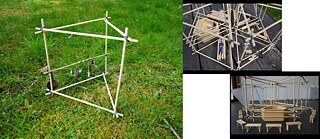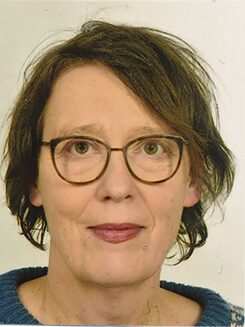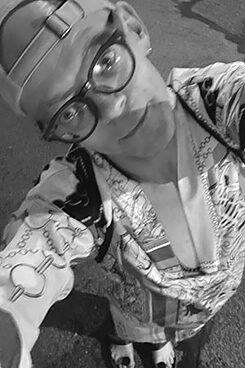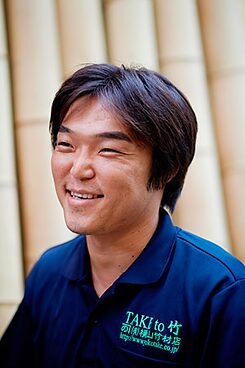Thursday, Aug. 31st, 2023 from 1:15 p.m.
The Theater as a Village - The Circular Economy in a Theater
Learning Tour|Design Week Kyoto 2023
-
Goethe-Institut Villa Kamogawa, Kyoto
-
Language
With Japanese-English consecutive interpretation
Pre-registration required Registration and information: Design Week Kyoto, Learning Tour (Peatix)

Design Week Kyoto 2023 will introduce the different production scenes in Kyoto and provide a platform for exchange between people, working techniques and experiences. Goethe-Institut Villa Kamogawa will participate as a spot in one of their programs, Learning Tour.
Theater stage designs are built, torn down and thrown away, productions played a few times and then thrown away as well, to the dustbin of history. Inspired by but also critical of the circular ecological society of the Edo period, theater makers and set designers Barbara Ehnes and Karla-Max Aschenbrenner design theater as a village resembling the utopia of a self-sustaining community of goods that no longer tells stories or produces garbage, but is instead managed by a compost.
The material they have chosen for the first incarnation of the project "Theater as Village" in Kyoto is bamboo. A sturdy, fast-growing plant found in many places of the world, it is the building material of the global village. Everything is held together without nails, by the traditional rope technique called NAWA GARAMI and by a few basic principles. Thus, the structure can return to nature as quickly as it appeared. During the learning tour, participants can look at the structure of the theater, which initially remains empty and is only filled with their ideas and exchange with the two theater makers about the principles and the basic ideas.
Barbara Ehnes
Barbara Ehnes studied fine arts in Amsterdam and stage design in the classes of Wilfried Minks and Marina Abramović at the HfBK Hamburg, as well as theater and literature studies at the University of Hamburg. Since 2001 she has worked continuously as a stage designer at numerous German and international theaters and opera houses, including with artistic partners: Stefan Pucher, Lydia Steier, Sebastian Baumgarten, Calixto Bieito, Jossi Wieler and Meg Stuart.
In 2005 she was awarded the stage prize "Opus". Together with Chris Kondek, she received the theater prize "Der Faust" in 2012. At the Wiener Festwochen 2013, Theater der Welt 2014 and the Ruhrtrieenale 2019 she was responsible for the artistic direction for staged installations, as well as the direction for the opera Alcina in Lucerne in 2023.
Since 2011, Barbara Ehnes has also worked as a professor at the Dresden University of Fine Arts. In 2020 she came to Japan for the first time for the production of "A dream of armageddon" at NNTT Tokyo.
see also: barbaraehnes.com and stuffincycles.com
Karla Max Aschenbrenner
Karla Max Aschenbrenner were involved in various international projects from 2008 to 2018 as artistic collaborators, head dramaturgs and managing directors, together with Frie Leysen at Theater der Welt 2010 and Wiener Festwochen 2014, with Seong Hee Kim at Asian Arts Theatre in Gwangju from 2015 to 2017, with Stefanie Carp at Ruhtriennale 2018 and from 2014 to 2015 they directed Südpol in Lucerne.
Before working in these contexts as program and festival makers, they were active as performers. In 2016 in Kinosaki with Theory of the Young Man, 2017 at the Nationaltheater Reinickendorf with Vinge/Müller or 2019 in Octopus Monk by Kuro Tanino and in Ferment:Mutterkorn by apparatus and 2023 with Barbara Ehnes in Alcina at the Luzerner Theater. In 2021 their song recital Prolapse Unveiled premiered at Boiler Berlin and was later invited to zeitraumexit Mannheim.
They studied European Media Studies at the University, the University of Applied Sciences and the Film Academy Konrad Wolf Potsdam and Dramaturgy at the University of Frankfurt am Main with Hans-Thies Lehmann. They also publish and teach regularly. They pursue their international cultural worker practice as an artistic engagement with the world, which they do not want to leave to globalization and the economic model.
Yuki Yokoyama
born in 1979 in Kyoto.
He joined the Yokoyama Takezaiten in 2006 as the fourth generation.
His works, making full use of his craftsmanship and bamboo art techniques, have been used in many famous architectural structures in Japan and abroad. He actively participates in new projects and shares his bamboo art techniques, such as workshops and joint productions with artists in Japan and abroad.
In 2014, he developed the world’s first "non-combustible bamboo," which was approved by Japan's Fire and Disaster Prevention Agency.
In 2020, he was recognized as a "Kyo-Mono Certified Craftsman" with Kyo-Mei-Chiku. E, a title awarded to young craftsmen who are the future leaders of traditional industries, especially those with outstanding skills and ambition. In 2021, Kyo-Mei-Chiku bamboo was developed with SIAA-certified "antibacterial and antiviral" functions to combat the coronavirus.
Theater stage designs are built, torn down and thrown away, productions played a few times and then thrown away as well, to the dustbin of history. Inspired by but also critical of the circular ecological society of the Edo period, theater makers and set designers Barbara Ehnes and Karla-Max Aschenbrenner design theater as a village resembling the utopia of a self-sustaining community of goods that no longer tells stories or produces garbage, but is instead managed by a compost.
The material they have chosen for the first incarnation of the project "Theater as Village" in Kyoto is bamboo. A sturdy, fast-growing plant found in many places of the world, it is the building material of the global village. Everything is held together without nails, by the traditional rope technique called NAWA GARAMI and by a few basic principles. Thus, the structure can return to nature as quickly as it appeared. During the learning tour, participants can look at the structure of the theater, which initially remains empty and is only filled with their ideas and exchange with the two theater makers about the principles and the basic ideas.
Barbara Ehnes
Barbara Ehnes studied fine arts in Amsterdam and stage design in the classes of Wilfried Minks and Marina Abramović at the HfBK Hamburg, as well as theater and literature studies at the University of Hamburg. Since 2001 she has worked continuously as a stage designer at numerous German and international theaters and opera houses, including with artistic partners: Stefan Pucher, Lydia Steier, Sebastian Baumgarten, Calixto Bieito, Jossi Wieler and Meg Stuart.
In 2005 she was awarded the stage prize "Opus". Together with Chris Kondek, she received the theater prize "Der Faust" in 2012. At the Wiener Festwochen 2013, Theater der Welt 2014 and the Ruhrtrieenale 2019 she was responsible for the artistic direction for staged installations, as well as the direction for the opera Alcina in Lucerne in 2023.
Since 2011, Barbara Ehnes has also worked as a professor at the Dresden University of Fine Arts. In 2020 she came to Japan for the first time for the production of "A dream of armageddon" at NNTT Tokyo.
see also: barbaraehnes.com and stuffincycles.com
Karla Max Aschenbrenner
Karla Max Aschenbrenner were involved in various international projects from 2008 to 2018 as artistic collaborators, head dramaturgs and managing directors, together with Frie Leysen at Theater der Welt 2010 and Wiener Festwochen 2014, with Seong Hee Kim at Asian Arts Theatre in Gwangju from 2015 to 2017, with Stefanie Carp at Ruhtriennale 2018 and from 2014 to 2015 they directed Südpol in Lucerne.
Before working in these contexts as program and festival makers, they were active as performers. In 2016 in Kinosaki with Theory of the Young Man, 2017 at the Nationaltheater Reinickendorf with Vinge/Müller or 2019 in Octopus Monk by Kuro Tanino and in Ferment:Mutterkorn by apparatus and 2023 with Barbara Ehnes in Alcina at the Luzerner Theater. In 2021 their song recital Prolapse Unveiled premiered at Boiler Berlin and was later invited to zeitraumexit Mannheim.
They studied European Media Studies at the University, the University of Applied Sciences and the Film Academy Konrad Wolf Potsdam and Dramaturgy at the University of Frankfurt am Main with Hans-Thies Lehmann. They also publish and teach regularly. They pursue their international cultural worker practice as an artistic engagement with the world, which they do not want to leave to globalization and the economic model.
Yuki Yokoyama
born in 1979 in Kyoto.
He joined the Yokoyama Takezaiten in 2006 as the fourth generation.
His works, making full use of his craftsmanship and bamboo art techniques, have been used in many famous architectural structures in Japan and abroad. He actively participates in new projects and shares his bamboo art techniques, such as workshops and joint productions with artists in Japan and abroad.
In 2014, he developed the world’s first "non-combustible bamboo," which was approved by Japan's Fire and Disaster Prevention Agency.
In 2020, he was recognized as a "Kyo-Mono Certified Craftsman" with Kyo-Mei-Chiku. E, a title awarded to young craftsmen who are the future leaders of traditional industries, especially those with outstanding skills and ambition. In 2021, Kyo-Mei-Chiku bamboo was developed with SIAA-certified "antibacterial and antiviral" functions to combat the coronavirus.
Related links
Location
Goethe-Institut Villa Kamogawa
Kawahara-cho 19-3, Yoshida, Sakyo-ku
Kyoto
606-8305 Japan
Kawahara-cho 19-3, Yoshida, Sakyo-ku
Kyoto
606-8305 Japan
Location
Goethe-Institut Villa Kamogawa
Kawahara-cho 19-3, Yoshida, Sakyo-ku
Kyoto
606-8305 Japan
Kawahara-cho 19-3, Yoshida, Sakyo-ku
Kyoto
606-8305 Japan


